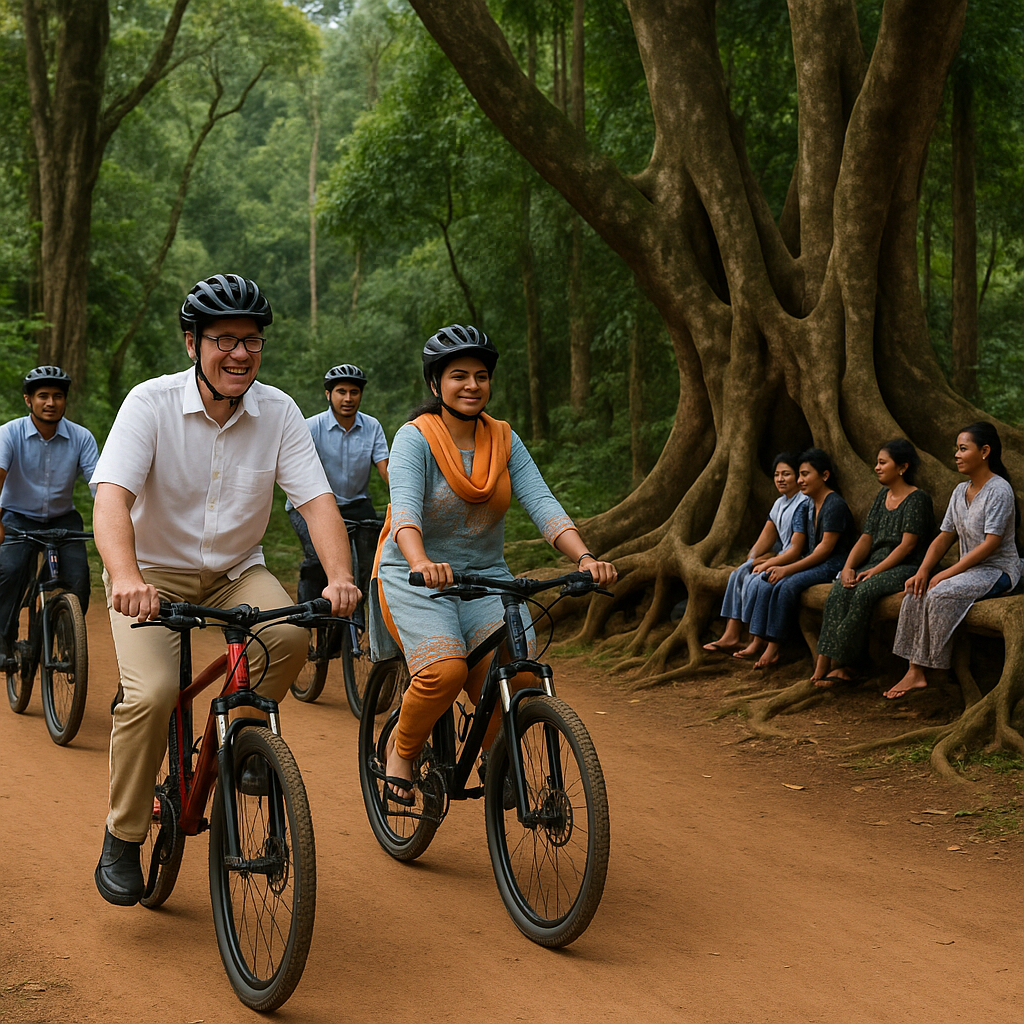Bangladesh: Jaflong’s Khasi Punjee Launches Community-Based Tourism to Empower Locals
Jaflong, nestled in the Sylhet division of northeastern Bangladesh, is renowned for its enchanting landscapes, lush tea gardens, and the rich cultural traditions of the Khasi indigenous community.

- Country:
- India
In a groundbreaking step toward sustainable and inclusive tourism, the Bangladesh Tourism Board (BTB), under the Ministry of Civil Aviation and Tourism, has partnered with the International Labour Organization (ILO) to launch a Community-Based Tourism (CBT) model in the scenic Khasi Punjee area of Jaflong, Sylhet. This innovative initiative is part of the ILO’s Canada-funded ProGRESS Project, which aims to promote decent employment opportunities and protect indigenous heritage while preserving the natural environment.
A Cultural and Natural Jewel in Sylhet
Jaflong, nestled in the Sylhet division of northeastern Bangladesh, is renowned for its enchanting landscapes, lush tea gardens, and the rich cultural traditions of the Khasi indigenous community. The new CBT program brings tourists directly into the heart of this vibrant region, allowing immersive experiences that highlight traditional Khasi hospitality, cuisine, music, and crafts—while also generating income for local residents.
At the heart of the initiative are four participating Khasi villages offering homestay accommodations. Each homestay has the capacity to host up to four guests and is managed by local families who have been trained in hospitality, hygiene, and customer service. Guests are welcomed with traditional Khasi dishes such as Ja Doh and Doh Kleh, and can participate in activities like boating on the Piayan River, cycling through picturesque tea estates, trekking through rainforests, and attending cultural performances.
Dignitaries Celebrate Grassroots Tourism Model
The official launch ceremony, held in Jaflong, was attended by a distinguished lineup of guests, including Dr. K. M. Kabirul Islam, Secretary of the Technical and Madrasah Education Division (TMED), Ministry of Education, who served as the Chief Guest. Fatema Rahim Veena, Additional Secretary at the Ministry of Civil Aviation and Tourism (MOCAT), joined as Special Guest, while Tuomo Poutiainen, ILO Country Director for Bangladesh, attended as Guest of Honour.
Dignitaries participated in a ribbon-cutting ceremony at one of the homestays and toured various facilities set up under the project. They were treated to live performances by Khasi artists, local delicacies, and storytelling sessions with community elders—experiences that represent the core values of this tourism model.
Voices from the Ground: Leadership and Partnership
Speaking at the event, Dr. K. M. Kabirul Islam emphasized the importance of safeguarding both visitors and residents: “Community-based tourism is still new to Bangladesh. As we encourage visitors to explore our rural and indigenous areas, we must ensure that safety, cultural sensitivity, and sustainability are at the forefront. The Destination Management Committee has developed a code of conduct that all tourists are expected to follow.”
Tuomo Poutiainen, ILO Country Director, highlighted the broader vision behind the initiative: “This is more than just a destination—it’s a model for community empowerment. With a focus on women and youth, this program creates jobs, nurtures entrepreneurship, and celebrates cultural identity. At the same time, it conserves the environment through locally-driven solutions.”
Fatema Rahim Veena called for stronger institutional support: “Khasi Punjee is one of Bangladesh’s hidden gems. For this model to be scalable and impactful, we need continued collaboration from government agencies, NGOs, and development partners.”
Community-Led Destination Management
At the core of the initiative lies the Destination Management Committee (DMC), a local governance body composed of representatives from each participating village. The DMC is tasked with overseeing day-to-day operations, enforcing ethical tourism practices, coordinating training and awareness campaigns, and collecting a modest “Green Activity Fee” from tourists. This fee supports road upkeep, waste disposal, and ecological conservation.
One key element of the CBT model is its focus on inclusivity. Women and young people are encouraged to take active roles as tour guides, homestay managers, food service providers, and craft sellers. Artisan workshops and business training sessions have already been conducted, enabling many to transform traditional skills into viable enterprises.
A Destination Full of Experiences
The CBT program offers tourists a wide range of immersive activities:
-
Cultural Engagement: Storytelling sessions with Khasi elders, traditional dance performances, and musical demonstrations at the community museum.
-
Eco-Adventure: Boating and fishing on the Piayan River, hiking to nearby waterfalls, cycling through scenic routes.
-
Culinary Tourism: Enjoying home-cooked Khasi dishes using locally sourced ingredients and exploring the newly launched community restaurant.
-
Ethical Shopping: Purchasing locally made handicrafts, herbal products, and traditional textiles directly from artisans.
A Step Toward Responsible Tourism
By placing local communities at the center of tourism planning and execution, this initiative represents a paradigm shift in Bangladesh’s tourism industry. It offers a blueprint for other regions aiming to promote heritage tourism, community ownership, and environmental stewardship.
The project has already sparked interest among policymakers, development agencies, and environmentalists. If successfully scaled, this CBT model could contribute significantly to Bangladesh’s sustainable development goals, especially in rural employment, gender equity, and cultural preservation.
As Jaflong opens its heart to the world, it invites travelers not just to visit—but to connect, learn, and grow alongside the very communities that make this destination so unique.










